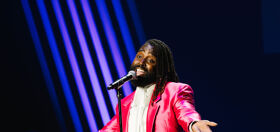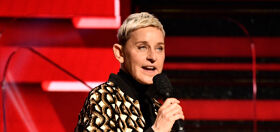
Everyone’s heard of “gay voice,” but researchers in Australia wanted to study whether people could detect a “bi voice” in bisexual men.
The first-of-its-kind study, published in The Journal of Sex and Research, found that people couldn’t accurately detect bisexuality in bi men’s voices. Even more interesting, the study’s participants regarded bi men’s voices as more masculine than straight men’s voices.
Psychology researchers at the University of Sydney had 70 self-identified heterosexual participants listen to recordings of 60 men’s voices: 20 of the recordings were of gay men, 20 were of bi men, and 20 were straight. The participants had to live in Australia for more than five years to become used to Australian accents.
Each recording had the men reciting the following line from Australia’s national anthem: “Australians all let us rejoice, For we are one and free; We’ve golden soil and wealth for toil; Our home is girt by sea.” The recordings were made on each man’s smartphone without any additional instructions from researchers.
How about we take this to the next level?
Our newsletter is like a refreshing cocktail (or mocktail) of LGBTQ+ entertainment and pop culture, served up with a side of eye-candy.
After hearing each voice, participants were asked to categorize each man’s sexual orientation and to decide how masculine or feminine it sounded on a nine-point scale. Researchers expected that participants would consider the bi men’s voices as “more feminine than straight men, but less feminine than gay men.”
But while the participants correctly categorized the sexual orientations of the gay and straight speakers “at rates greater than chance” (that is, better than a random guess), participants were unable to tell which voices belonged to bi men at rates greater than chance.
“Bisexual voices were consistently misperceived as being the most exclusively female attracted, and, contrary to expectations, were perceived as the most masculine sounding of all the speakers,” the study found.
Researchers wrote that stereotypically “gay voices” in English-speaking men tend to have a higher pitch, wider pitch range, longer vowels, expanded vowel space, and a hissy “S” sound — all of which are perceived as more feminine and more submissive. In the 2014 documentary, Do I Sound Gay?, director David Thorpe said that gay voices also have typically over-exaggerated O sounds and hit final T sounds with more precision.
Comparatively, “straight voices” in English-speaking men lack these qualities and also tend to have a lower pitch that is perceived as more masculine and more dominant.
While brain chemistry may predispose some gay men to these gay vocal traits, previous studies have suggested that some gay men deliberately use these speech patterns to make their sexual orientations clearly known and to deviate from rigidly enforced masculine norms.
The psychologists behind the study said they wanted to examine bi voices as a way to combat “bisexual erasure” — the tendency to overlook anything other than exclusively straight and gay sexual orientations — in society and scientific research.
It could be that bi guys “mask their true speech patterns” and try to sound more masculine in order to avoid discrimination, researchers wrote. It could also be that participants weren’t able to detect “bi voices” because distinct bisexual vocal cues aren’t as well known by the general public and are, thus, harder to detect.
Researchers said more study is required to figure out what a bi man’s distinct vocal cues might be. But they also said that whether or not people can identify a man’s bisexual identity from his voice has “important social ramifications.”
“Being misconstrued as straight or gay based on one’s voice, might contribute to a sense of erasure and alienation” that is already high among bi men who feel discriminated against by both the straight and gay communities, the researchers wrote.
Related:
These empowering “gay voice” tweets have us cheering in every octave
Louder for the people in the back!





















dbmcvey
Why do we have to keep doing this?
Caelestius
Exactly. The time and energy spent trying to “characterize” us is a tawdry work-around for reassuring some men that they “aren’t” us. Which is classic homophobia.
SDR94103
you sound gay.
Troyfight
…hmm. interesting report …but kind of expected I suppose.
bachy
Unlike gay or straight men, I would imagine that bi men are the least obsessed with whether or not they sound “gender-appropriate” and therefore have the most relaxed, confident and natural-sounding voices.
basils_Herald
It is unscientific to project a hot take on a culture or subculture onto a few hundred voice recordings and call it psychology or sociology. Nothing statistically significant could ever come from such a study.